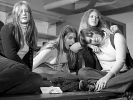Eye For Film >> Movies >> Don't Expect Too Much (2011) Film Review
Companion piece to the film which it documents - We Can’t Go Home Again – this work by Susan Ray, Nicholas’ widow, adds a very welcome sense of coherence to the story of that film’s fractured making. Much more enjoyable than the film itself, this documentary may be a little unadventurous in places – it’s mostly a collection of talking heads – but it offers us an important last look at the man Jean-Luc Godard held personally responsible for cinema.
The students involved in the making of Ray’s last film are interviewed to discover the impact the film, and the enigmatic filmmaker, has had on their lives. Some, such as a certain Jim Jarmusch, still talk about the man in tones of reverence and genuine love. Others clearly found Ray’s demanding approach to the work, and his even more demanding approach to life, too much to handle. There’s also a certain sense of bitterness at the final vision of the film, with some believing that Ray ended up murdering it with his never-ending editing.

This revealing portrait touches a depth of meaning rendered inaccessible by the film itself. It's a portrait of a man inconsolably tormented by inner demons, who thought that in the idealism of the young students he could find some sort of truth to placate those demons - a truth more lasting than the alcohol and drugs he tried to drown them in. But, as the film witnesses, there was no such all-encompassing truth. No shimmering vision of humanity emerges from the footage, and Ray’s relentless search for it in the editing suite was as sad as it was futile. Spanish director and Ray admirer Victor Erice puts it best: “It is a failed film, but one that is exemplary in its failure.”
In addition to the interviews there is some unedited footage and behind the scenes photographs showing Ray at work. At times a paternal figure, letting the students stay at his home indefinitely and often showing a sensitive interest in their lives, he could also be a savage perfectionist, intolerant of some of the students' amateur approaches to filmmaking. He was as complex as he was contradictory, and never seemed have a firm idea of what the film was actually about.
That there is any film to talk about is down to Ray’s old friends and their generosity. With no money to finish the film, Ray rattled through his black phone book – the photographs of this, and the addresses and phone numbers it contains (John Wayne, Ava Gardner, Richard Burton...), are a genuine thrill – and he landed upon Francis Ford Coppola and his Zeotrope Studios.
Walter Murch – sound engineer and editor on things like Apocalypse Now and The Conversation – describes turning up at Coppola’s house to find this “homeless guy” shambling around with his hundreds of unmanageable reels of film. It's funny but also sadly poignant. An innovative ghost of Hollywood’s glorious years, Ray just couldn’t regain a handle on the cinema he’d had a part in defining.
Reviewed on: 23 Jun 2012
















